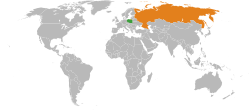Poland–Russia relations
 |
|
|
Poland |
Russia |
|---|---|
|
Poland |
Soviet Union |
|---|---|
Poland–Russia relations (Polish: Stosunki polsko-rosyjskie, Russian: Российско-польские отношения) have a long history but often turbulent, dating to the late Middle Ages, when the Kingdom of Poland and Grand Duchy of Muscovy struggled over control of their borderlands. Over centuries, there have been several Polish–Russian Wars, with Poland once occupying Moscow and later Russia controlling much of Poland in the 19th as well as in the 20th century, damaging relations. Polish–Russian relations entered a new phase following the fall of communism, 1989–1993. Since then Polish–Russian relations have at times seen both improvement and deterioration. According to a 2013 BBC World Service poll, 19 percent of Poles view Russia's influence positively while 49 percent express a negative view.
However, since the Russian annexation of Crimea, over 60-80% Poles are worried over the future conflict with Russia, giving the fact Russia still maintains control in Kaliningrad, and the pro-Russian Belarus.
Relations between Poland and Russia (Muscovy) have been tense from the beginning, as the increasingly desperate Grand Duchy of Lithuania involved the Kingdom of Poland into its war with Muscovy around 16th century. As Polish historian Andrzej Nowak wrote, while there were occasional contacts between Poles and Russians before that, it was the Polish union with Lithuania which brought pro-Western Catholic Poland and Orthodox Russia into a real, constant relation with both states engaged in "the contest for the political, strategic and civilizational preponderance in Central and Eastern Europe". While there were occasional attempts to create an alliance between the new Polish–Lithuanian state and the Muscovy (including several attempts to elect the Muscovite tsars to the Polish throne and create the Polish–Lithuanian–Muscovite Commonwealth), they all failed. Instead, several wars occurred. Notably, during the Polish–Muscovite War (1605–18), Polish forces took Moscow – an event that would become one of the many defining moments of the future Polish–Russian relations. Muscovy, now transforming into the Russian Empire, was able to take advantage of the weakening Commonwealth, taking over disputed territories and moving its borders westwards in the aftermath of the Russo-Polish War (1654–67). By the beginning of the 18th century, with the deterioration of the Commonwealth political system (Golden Liberty) into anarchy, Russians were able to intervene in internal Polish affairs at will, politically and militarily, see (Silent Sejm, War of the Polish Succession). Around the mid-18th century, the influence of ambassadors and envoys from Russia to Poland, could be compared to those of colonial viceroys and the Commonwealth was seen by Russians as a form of protectorate. With the failure of the Bar Confederation, opposing the Russian influence, the First Partition took place in 1772; by 1795 three partitions of Poland erased Poland from the map. As Nowak remarked, "a new justification for Russian colonialism gathered strength from the Enlightenment": Poland was portrayed by Russians as an anarchic, dangerous country: its Catholic and democratic ideas had to be suppressed by the more enlightened neighbors." Over the next 123 years, a large part of Polish population and former territory would be subject to the rule of the Russian Empire. Several uprisings (most notably, the November Uprising and the January Uprising) would take place, attempting to regain Polish independence and stop the Russification and similar policies, aimed at removal of any traces of former Polish rule or Polish cultural influence, however only in the aftermath of the First World War would Poland regain independence (as the Second Polish Republic).
...
Wikipedia
